Foodwise Spring

Welcome to edition #57 of Foodwise!
Food production and supply chains have shown great resilience in the face of the unprecedented challenges of COVID-19 over the past 18months.
Throughout, food produced, manufactured and sold in NSW remains amongst the safest to eat in the world.
Food businesses have discovered innovative ways of operating and have expanded their capabilities. We are proud to continue to support our industry partners as they adapt to a challenging and changing environment.
We hope you enjoy this edition of Foodwise. As always, we welcome your comments and feedback, so please feel free to drop us a line with any suggestions.
For more information visit the NSW Food Authority website, email food.contact@dpi.nsw.gov.au or call the Helpline on 1300 552 406.
New food safety Easter Show stand fun for families
The NSW Food Authority debuted the Food Safety Investigation (FSI) Kitchen Crimes Stand at the 2021 Sydney Royal Easter Show, encouraging kids to use their detective skills to identify poor food handling and personal hygiene habits.
Families visited the stand at Food Farm Pavilion, moving through interactive ‘crime zones’ to identify food safety issues in contaminated kitchen scenes, find the guilty offenders in a fridge ‘line up’ and learn about the golden rules of food safety.
When families made it to the end of the food safety crime zone, kids were presented with a Junior FSI Squad Bag to continue the detective work at home and rate the cleanliness and safety of their kitchen at home.


Expert Food Authority staff were on hand throughout the show, providing food safety advice and answering further questions from future detectives.


Kids can still join the junior FSI Squad by solving kitchen crimes and downloading the workbook on the Food Authority junior FSI Squad webpage.
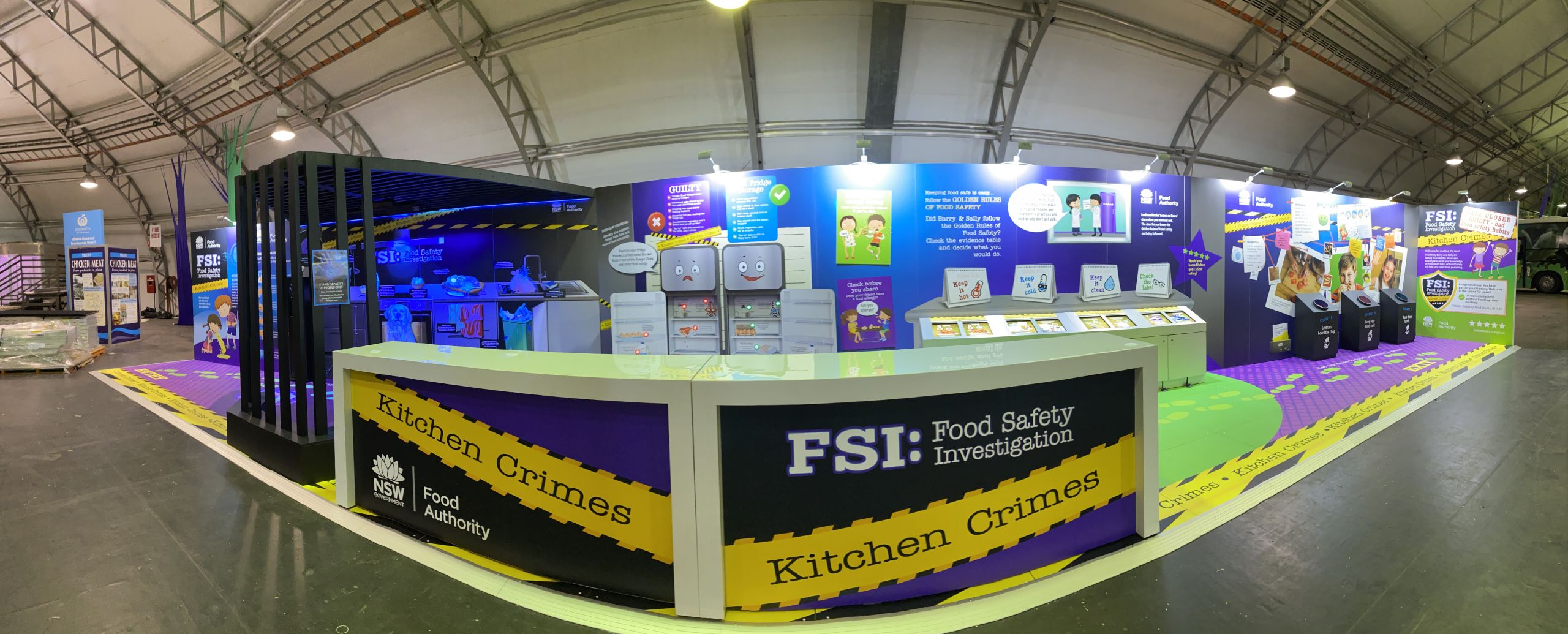
NSW Food Authority partners with 2021 AIFST Convention
The NSW Food Authority is pleased to join the 2021 Australian Institute of Food Science & Technology (AIFST21) Convention as exclusive gold partners for the food industry event.
Due to the evolving COVID-19 situation, the AIFST21 Convention will now be held as a virtual event over four days in October.
The new dates are 11, 12, 19 and 21 October 2021.
The theme for AIFST21 is 'Food Science - delivering in a changing world' which focuses on the challenges and opportunities for food science and the food industry in a world where ‘change’ seems to be the only constant.
Over the course of the four days, AIFST21 will feature more than 65 speakers drawn from diverse backgrounds in food science, food technology and the food industry, and will include presentations from the NSW Food Authority.
The AIFST are currently adapting the program to the new 4-day format to ensure it remains diverse, and the revised program will be published on the AIFST21 convention page by Monday August 30. Food safety is a featured topic with presentations on microbiological safety, allergens, traceability systems, advances in nutrition, and sensory and consumer science.
AIFST represents thousands of food industry professionals working in all facets of the food industry including food safety, science, technology, engineering, new product development, innovation, regulation, quality assurance and microbiology, as well as those in leadership positions with the academic, industry and private sectors.
The NSW Food Authority’s association with excellence in food science, raises greater awareness of our role in evidence-based risk mitigation and policy development, and reinforces the government’s commitment to food safety, confidence and certainty across the supply chain as detailed in the NSW Government Food Safety Strategy 2015-2021.
For more AIFST event and session information click here.

New biosecurity guide for land use developments
The NSW Department of Primary Industries (NSW DPI) recently published the Guide to Biosecurity Risk Management in Land Use Planning and Development (the guide) which outlines the biosecurity considerations in the assessment and development of proposed agricultural enterprises and activities.
The guide supports development landowners or agents, assessment authorities, government agencies and communities interested in land use planning. The document can be used to guide strategic land use planning and assist in individual development assessments.
Development landholders, agents and planning consent authorities can use the guide as a resource throughout the lifespan of a development to consider potential biosecurity risks, and ensure all practical measures are taken to prevent, eliminate or minimise the potential impact on the environment, the economy and the community.
The guide provides landowners and agents with examples of planning considerations for developments, like suggestions for minimal buffer zones to other farm and general infrastructure. Other information and resources are linked to these examples and cover several development types:
- Dairies
- Feedlots
- Pig farms
- Poultry farms
- Apiaries
- Controlled environment horticulture
- Viticulture and orchards
- Nursery production
- Aquaculture
- Waste disposal or resource management facilities
Find the Guide to Biosecurity Risk Management in Land Use Planning and Development here.
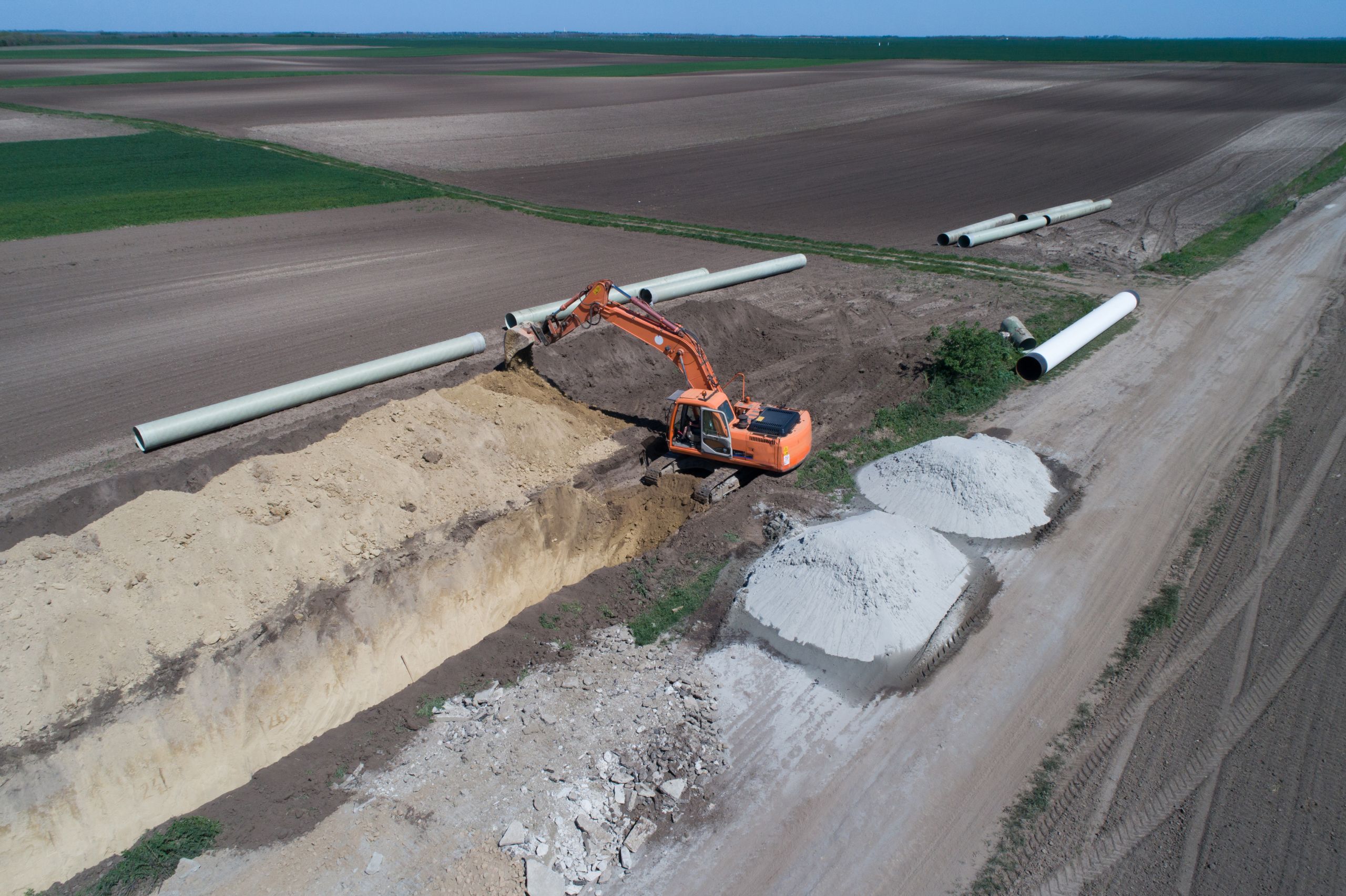
RETAIL

Allergy aware education booklet updated with new requirements
The allergy education booklet Be Prepared. Be Allergy Aware, produced by the NSW Food Authority and Allergy & Anaphylaxis Australia was recently updated to include new requirements for declaring common food allergens on food labels.
The booklet was developed for the retail food service sector, and includes new requirements for declaring common food allergens on food labels to help people quickly and easily find the relevant information they need to make informed food safety choices.
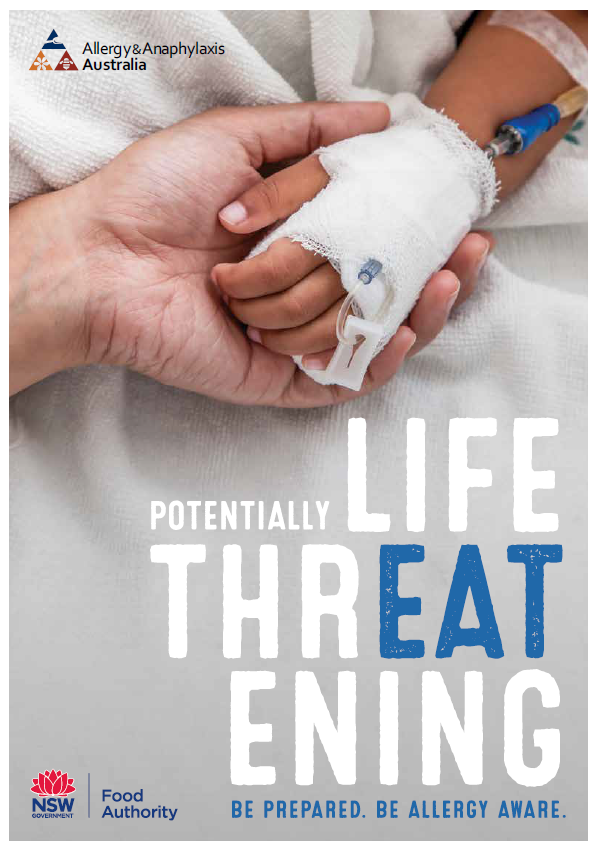
These changes commenced on 25 February 2021 with a three-year transition period.
Food allergy education aims to help the wider community support people living with food allergies to safely manage regular events like eating out and ensure consumers know what to do when someone they know has a reaction. It also enables food businesses to provide accurate information about food allergens that may be contained in their product.
Other updates to the booklet include real-life examples of a good and bad customer experience, as well as a worst-case scenario, such as the story of Nathan.
Nathan had shared a meal with family at a restaurant that had been advised of his food allergies at the time of booking.
Once everybody’s food had arrived at the table, Nathan began to consume his food and immediately complained of an allergic reaction to the food he was given. CPR was performed after he collapsed and he was then transported by ambulance where he was placed on life support. Sadly, Nathan died three days later.
The Food Authority commenced proceedings in the NSW Supreme Court against the company operating the restaurant. The company pleaded guilty to one charge of selling food, namely hummus containing sesame, that the company ought reasonably to have known was falsely described and was likely to cause physical harm to a consumer of the food who relied on the description. The company was convicted and fined over $100,000.
Australia has one of the highest rates of food allergies in the world and statistics show that one in ten babies born in Australia today will develop a food allergy.
The Food Authority website is a great resource for people who live with food allergies, or parents and carers seeking information to help a child diagnosed with food allergies.
There are also programs and initiatives in place to help educate and inform people and businesses about their responsibilities when it comes to food allergies.
More information about food allergies for food service businesses and consumers, including the Be Prepared. Be Allergy Aware booklet are available from the NSW Food Authority website www.foodauthority.nsw.gov.au
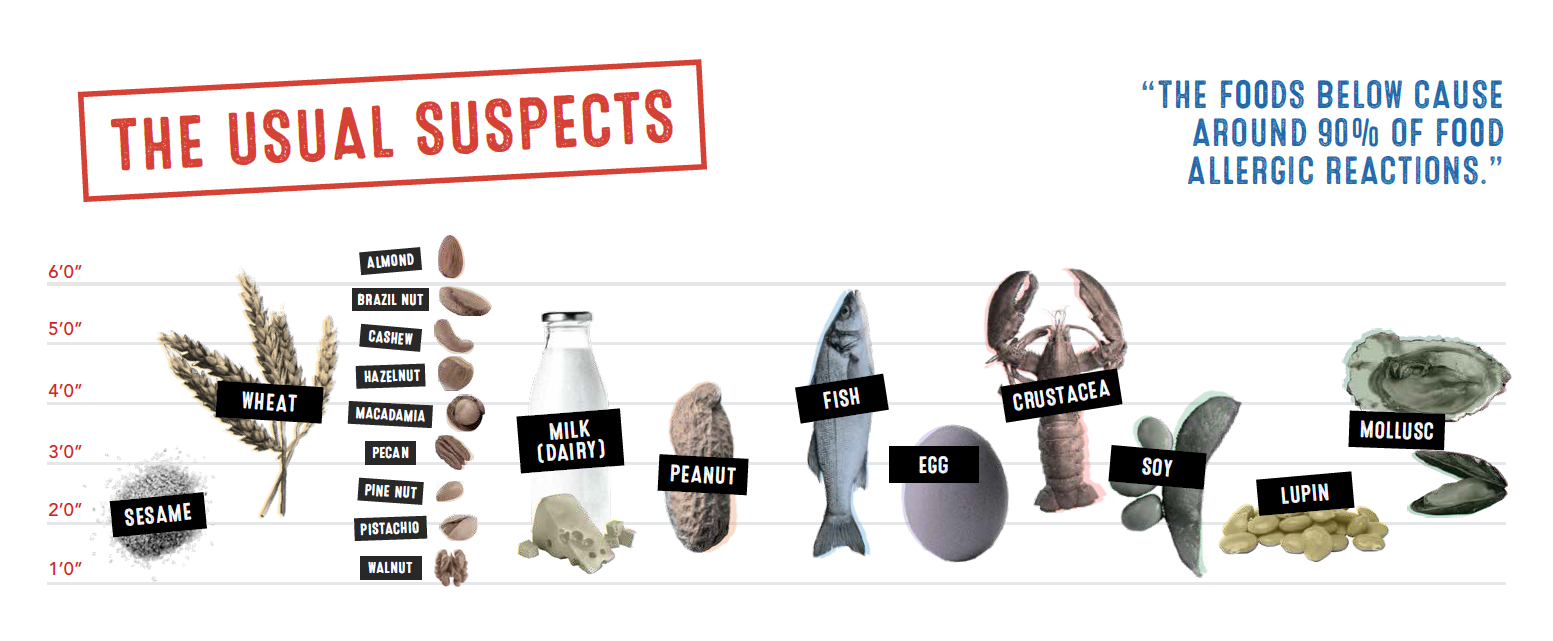
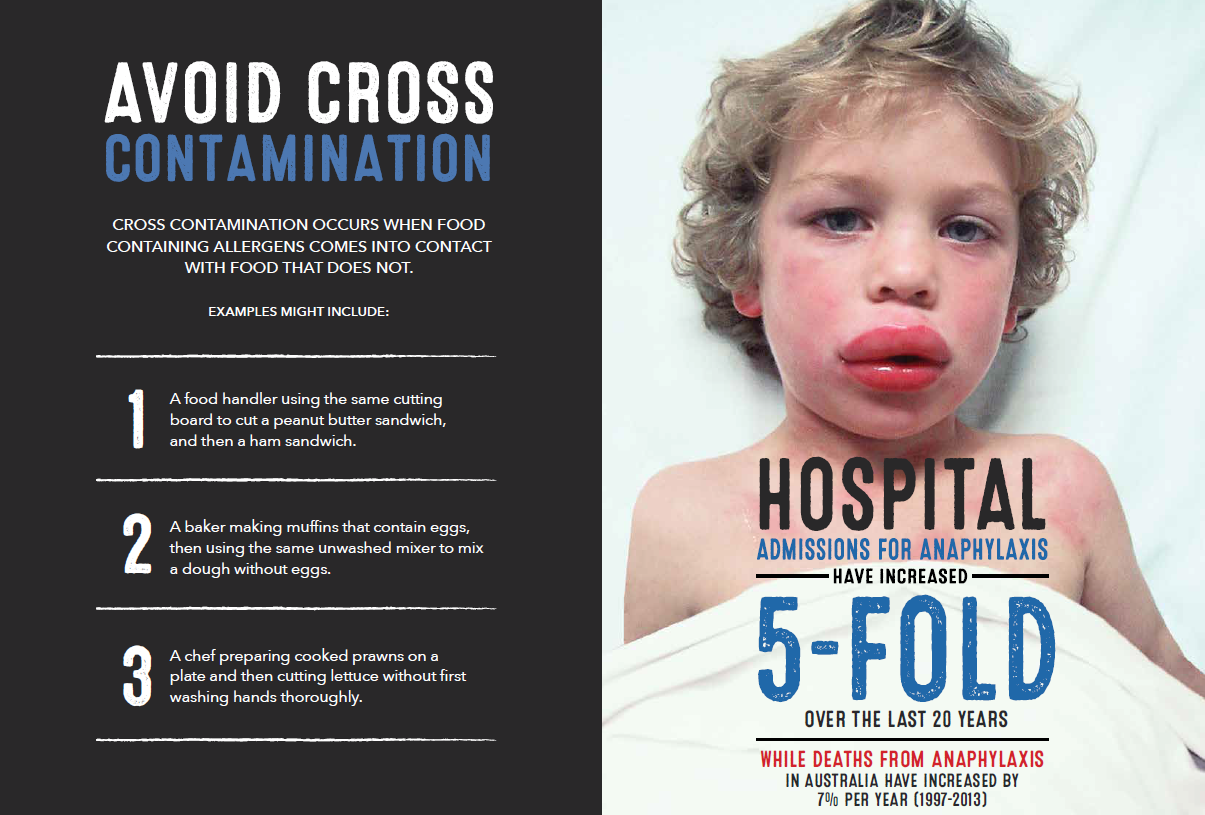
Retail Information Sessions return in Maitland
The first Retail Information Session for 2021 held at the East Maitland Bowling Club earlier this year was the first face-to-face session held since 2019 due to COVID-19.
The sold-out session had 35 participants from 32 local food businesses who were excited to meet food safety experts and council staff face-to-face again. Participants were welcomed by Maitland City Council Mayor Cr Loretta Baker who has been a Maitland resident for over 30 years and is familiar with the challenges faced by small businesses.
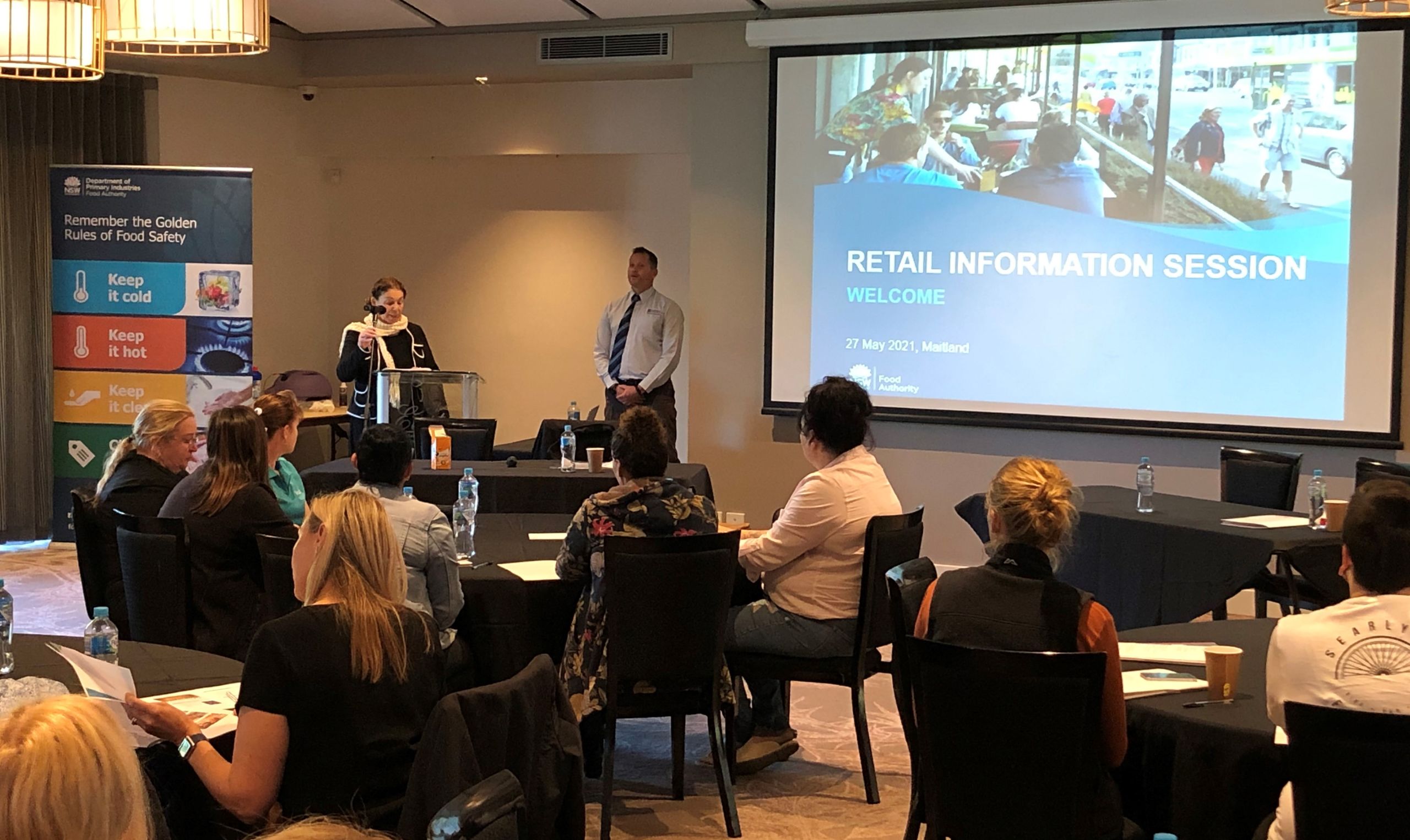
Maitland City Council Mayor Cr Loretta Baker welcomes attendees to the information session
Maitland City Council Mayor Cr Loretta Baker welcomes attendees to the information session
NSW Food Authority’s Local Government Unit (LGU) Manager, Andrew Davies chaired the session which had several presentations by Food Authority and Maitland City Council staff. Presentations included overviews on the roles of the Food Authority and local councils under the Food Regulation Partnership (FRP), Council policies on outdoor dining, smoking laws and pets in dining areas, information on reducing the risk of foodborne illness, and an overview of the Scores on Doors and Food Safety Supervisor retail food sector programs.
Several interactive demonstrations also covered the importance of proper cleaning and sanitising with gloves, using glitter bug potion for handwashing training and use of protein swabs to gauge cleanliness.
Participants found the event educational and informative and enjoyed opportunities to network, ask questions, and interact with Food Authority and Maitland City Council staff.
The FRP is recognised as a successful cooperative framework between State and Local Government in NSW. As part of this framework the LGU provide training and networking opportunities for councils and retail food businesses by hosting Retail Information Sessions three times per year across NSW.
The next Retail and Foodservice Information Session is yet to be confirmed for Snowy Valleys Council in November but likely be postponed to 2022.
FRP steering committee
The first Food Regulation Forum meeting of 2021 was held remotely on 25 May, to discuss the food surveillance activities in the retail food sector reported by local councils. The Forum also discussed the significant effects of drought, bushfires, floods and COVID-19 on local council’s ability to undertake their responsibilities leading to a decrease in retail sector inspection numbers.
The Forum was briefed on stakeholder meetings and training programs run by the NSW Food Authority’s LGU with local councils, such as the State Liaison Group, Authorised Officer training, and Retail and Foodservice Information Sessions. Proposed plans for a collaborative survey on ‘food notification’ and an authorised officer support program currently under development by LGU were also discussed by the Forum.
Forum members were advised LGU is working with local councils on the biennial FRP Workshop which was to be held at Rydges World Square on 12-13 August. Due to COVID-19 restrictions the workshop was postponed and is now confirmed for 17-18 March 2022 at the same venue.
Forum members are Mr Paul Braybrooks OAM as Chair, Dr Lisa Szabo and Mr Peter Day representing NSW Food Authority, Cr Phyllis Miller, Cr Ruth Fagan, and Cr Marianne Saliba representing Local Government NSW, Mr Angus Crichton, Ms Erin Hogan, and Mrs Lisa Hughes representing Environmental Health Australia, and Mrs Fiona Stalgis and Ms Yael Lang representing Development and Environmental Professionals’ Association.
The next Forum meeting will be online and is planned for November 2021.
MEAT
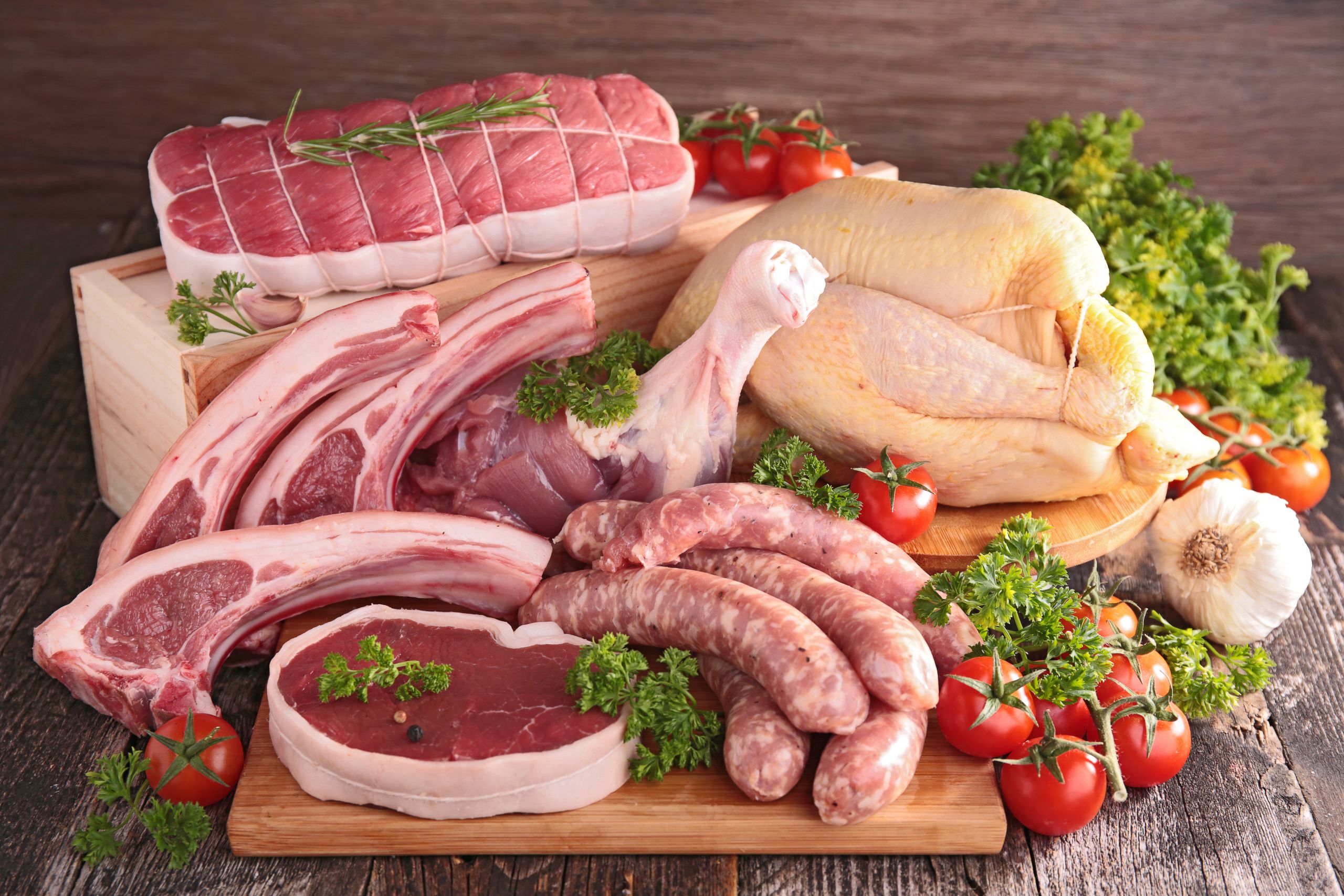
Inspections and audits
From July 2020 to June 2021, the Food Authority conducted 1,061 inspections and 1,366 audits of licensed meat businesses. This industry sector has recorded a compliance rate of 94%.
Of the businesses that failed their compliance audit and/or inspection during the reporting period, all subsequent follow up audits and/or inspections demonstrated compliance, indicating that licensees are implementing effective corrective actions in response to audit failures.
The availability of compliance data for all food sectors has been impacted by COVID-19, due to the redirection of resources to COVID-19 related compliance activities and the impacts of this on the regular compliance program.
The below table shows yearly comparable data for compliance and audit activity in the meat sector between reporting years 2019/20 and 2020/21.
| Reporting period | 2019/20 | 2020/21 |
|---|---|---|
| Total audits | 1,896 | 1,366 |
| Total inspections | 916 | 1,061 |
| Compliance rate | 93% | 94% |
Meat Industry Consultative Council
The last Meat Industry Consultative Council (MICC) meeting was held on Wednesday 21 July 2021.
Issues considered by the committee via video conference on 21 July included:
Updates on key and emerging issues in respective industries with a focus on concerns about COVID-19, resulting lockdown orders and their impacts on industry. Delays in COVID-19 test results are also a concern, however possible use of rapid COVID-19 testing was also discussed for its potential to help processors and manufacturers better manage their workforce and meet obligations such as animal welfare.
Committee members noted a report on meat industry compliance activities for the 2020-21 financial year where 94% of licensed meat businesses recorded an acceptable audit and/or inspection. Businesses with some non-compliance at their initial 2020-21 compliance audit / inspection demonstrated compliance at follow up audits / inspections. COVID-19 had a major impact on audit and inspection statistics as resources were re-deployed to undertake COVID-19 inspections.
A full summary of meeting outcomes is available here.
The next meeting of the MICC is to be advised.
The Meat Industry Consultative Council is attended by representatives from the Australian Meat Industry Council, Australian Pork Limited, Australian Chicken Meat Federation, NSW Farmers’ Association, Australian Meat Industry Council, meat businesses and NSW DPI.

New manual for safe manufacture of UCFM
The NSW Food Authority has developed a new manual for all existing approval processes and requirements to manufacture Uncooked Comminuted Fermented Meat (UCFM) products. Complying with the Manual for manufacturing Uncooked Comminuted Fermented Meat UCFM in NSW is now a condition for holding a licence to manufacture UCFM for sale in NSW.
UCFM products are made by a fermentation process and are not heat treated, so the harmful microorganisms present in the raw ingredients used to make UCFM and processing environment can survive and grow to cause illness.
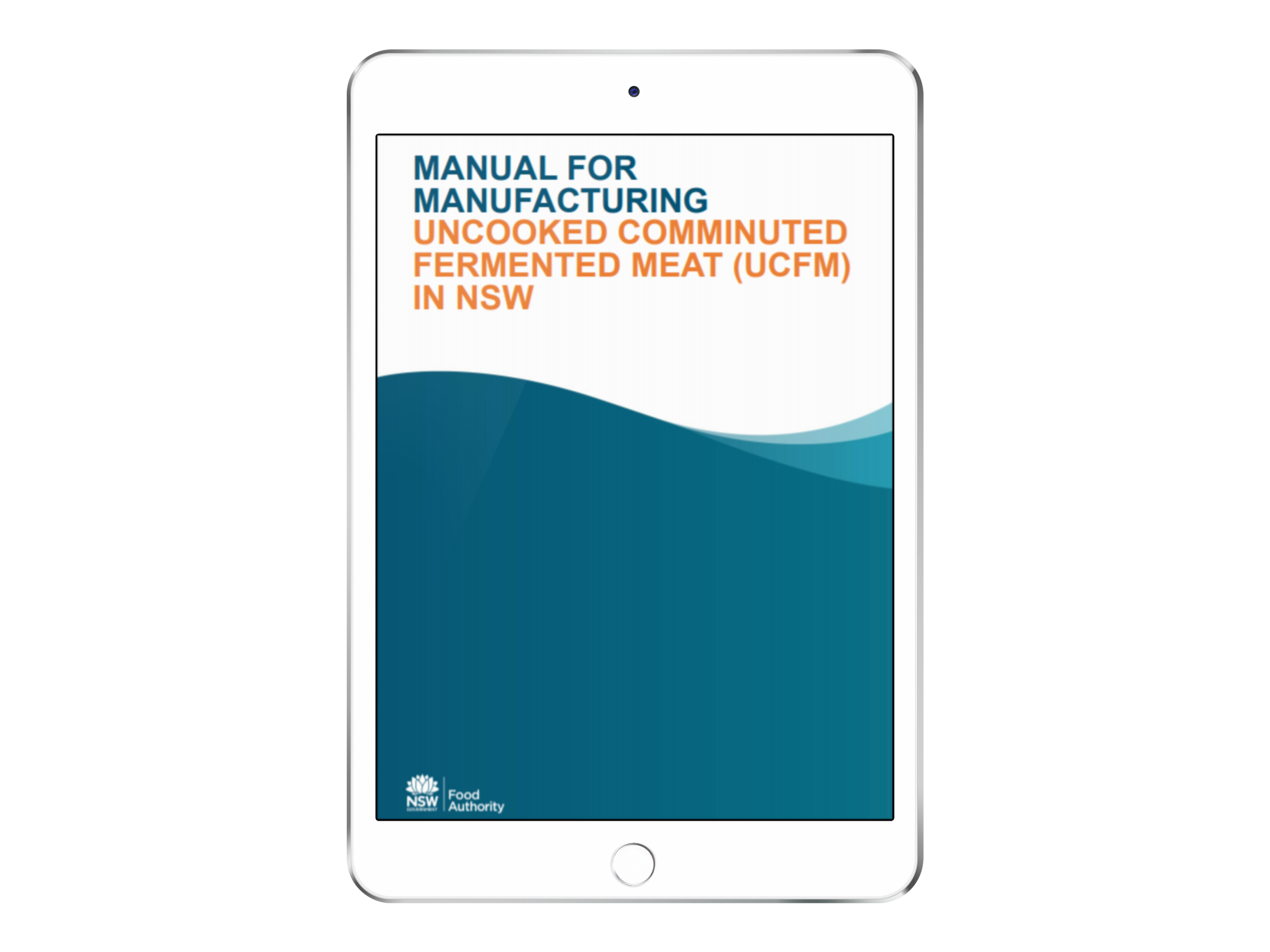
The UCFM Manual provides information on becoming licensed with the NSW Food Authority, developing a Food Safety Program (FSP), submitting a pro forma, and includes Food Standards Code (The Code) and NSW Food Regulation (2015) requirements for producing UCFM products for sale.
The UCFM Manual provides information on complying with regulations and safely manufacturing UCFM but does not cover all requirements of the Code. Food businesses should read the Code and ensure they meet all requirements as they relate to their business.
The Manual for manufacturing Uncooked Comminuted Fermented Meat UCFM in NSW is now available on the Food Authority website.
Meat food safety scheme risk assessment review
The NSW Food Authority has completed a risk assessment review of the Meat food safety scheme to report on new or updated information identified after a scan of current food safety issues that have impacted meat and meat products since the 2014 review.
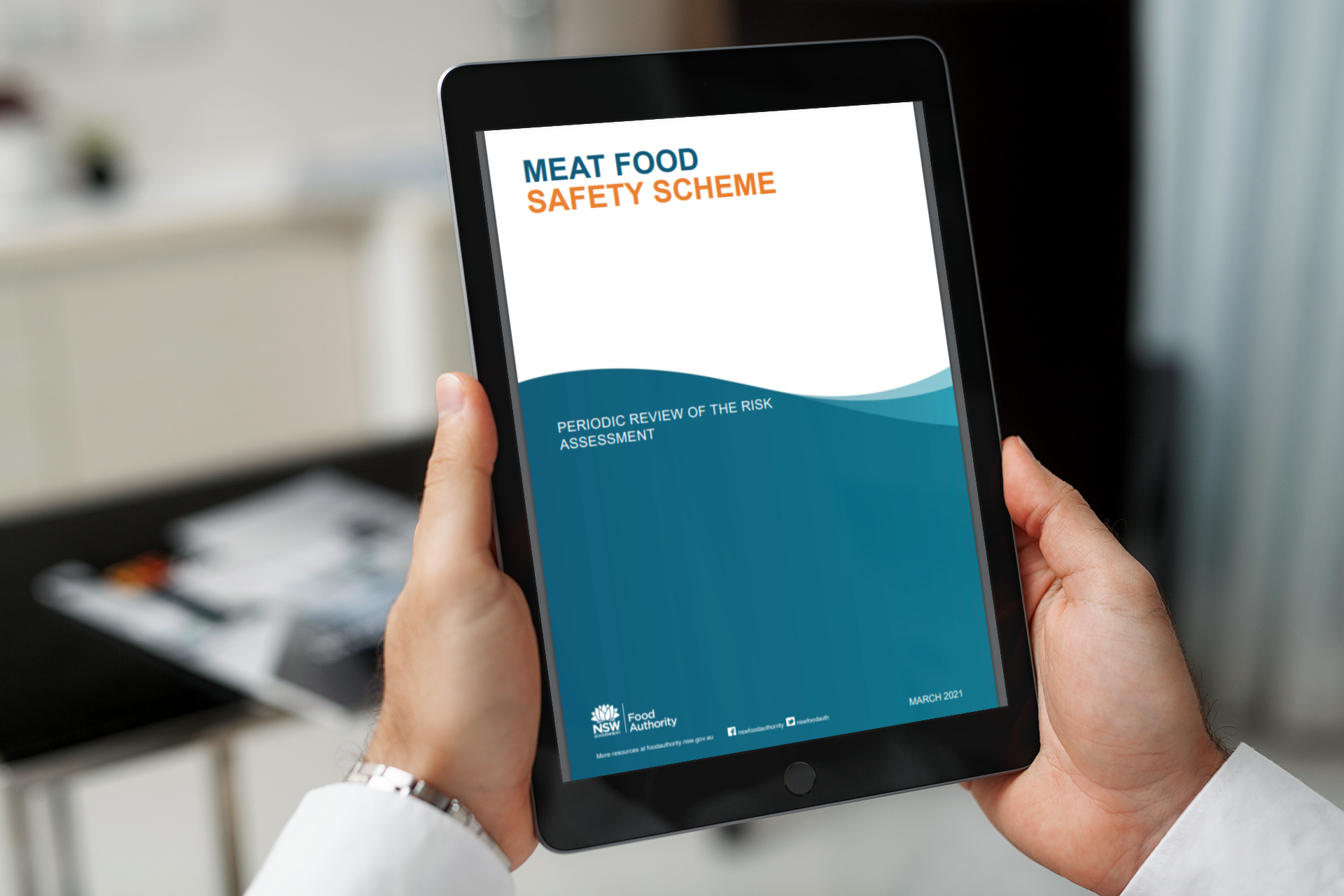
Periodical risk assessments of Food Authority food safety schemes form the development of the next version of the NSW Food Regulation to ensure it remains current and captures changes in the industry over time. It is important to the food industry as it sets minimum food safety requirements for food industry sectors that have been identified as higher risk, including the meat sector.
An analysis of risks identified in the 2014 assessment was updated to include foodborne illness reports in NSW from 2013 to 2018, finding meat alone or in complex foods was the suspected or responsible cause in a total of 9 outbreaks in NSW. Undercooking and temperature abuse were found to be contributing factors in several outbreaks involving liver dishes, ham and roast beef.
The 2021 risk assessment largely aligns with the 2014 assessment, finding current regulations are still applicable to manage risks and that the trend of outbreaks linked to undercooked animal liver dishes warrants further promotion of guidance material already prepared by the NSW Food Authority and Food Standards Australia New Zealand (FSANZ).
The 2021 assessment concludes that foodborne illness data and microbiological surveys of reared cattle, sheep, pig and goats shows they present a low risk to public health when processed under existing standards, while undercooking meat accounted for most meat related outbreaks in NSW from 2013 to 2018.
Strategic communication is required to ensure that educational material reaches those within the food service settings responsible for the safe preparation of dishes which pose a risk.
Continued baseline monitoring of the prevalence of foodborne pathogens in the production, processing and retail environment of these meat species, will remain necessary for future risk assessments of existing prevention and control efforts and whether they remain adequate to mitigate current and emerging food safety risks.
Read the Meat food safety scheme risk assessment review.
Integrity Systems record keeping webinar for producers
New South Wales livestock producers were offered practical tips and hints during a recent webinar on how to keep good records for the integrity system, on-farm actions that need to be recorded and what to expect during an audit.
The webinar was hosted by Integrity Systems Company in collaboration with NSW Department of Primary Industries and helped producers ensure they have their record keeping in order, with key points covering:
- The role of the Integrity Systems Company
- The importance of the red meat integrity system
- The integrity system programs – LPA and NLIS
- LPA accreditation and auditing
- Record keeping tips
- Uploading documents to LPA account
Producers can access a recording of the NSW webinar, along with handy resources and links here.
The next Integrity Systems Company webinar ‘Stand by What You Sell’ is scheduled for Wednesday 1 September and has been developed specifically for NSW livestock producers.
The webinar will provide some tips and hints on how to use the NLIS database in your farming business.
Date: Wednesday 1 September 2021
Time: 8.00-9.00pm (EST)
Register online at: https://bit.ly/3nA2WUu
If you can’t make it? ISC will send you a free copy of the webinar so you can catch up, all you need to do is register!
To register for all other ISC webinars, visit www.integritysystems.com.au/events
Biosecurity management and Emergency Animal Disease Preparedness program for abattoirs and knackeries
The NSW Department of Primary Industries (NSW DPI) has implemented Biosecurity Management Plans (BMP) that include advice on planning and preparing for emergency animal diseases as the newest tier in regulatory requirements for domestic abattoirs and knackeries.
The NSW livestock industry faces several emergency animal disease challenges such as African swine fever (ASF) which continues to sweep through Asia and Europe. ASF is highly contagious and currently untreatable so an outbreak would be devastating for Australia’s pork industry and damage trade markets and economy.
Domestic abattoirs and knackeries are the first point of animal health contact for some small landholders, so poor livestock disease knowledge and biosecurity at domestic operations can pose a potential biosecurity risk.
The Biosecurity management program sets the standard for activities needed to maintain compliance with the Biosecurity Act 2015 in domestic abattoirs and knackeries, ensuring these operations continue to play an important part in frontline detection and response to notifiable emergency animal disease events.
All licensed abattoirs and knackeries will be inspected for biosecurity management in 2021 and it is an ongoing requirement as part of regular compliance audits by an authorised officer. The inspection and compliance program ensures industry has a robust, risk-based system to maintain biosecurity which is consistently applied.
NSW DPI has a responsibility to ensure operations such as abattoirs and knackeries meet the requirements of the Biosecurity Act 2015.
The Biosecurity Management Plan implementation guidance factsheet and other useful resources were distributed to industry in a General Circular in February.
SEAFOOD

Inspections and audits
From June 2020 to June 2021, the Food Authority conducted 240 inspections and 193 audits of licensed seafood businesses. This industry sector has recorded a compliance rate of 95%.
The main areas where critical defects have been raised at audit continue to be with process control, analytical testing, and food safety program monitoring. There have been no consecutive audit failures and the clear majority of defects raised have been rectified immediately which demonstrates that effective corrective actions are being implemented by businesses.
The availability of compliance data for all food sectors has been impacted by COVID-19, due to the redirection of resources to COVID-19 related compliance activities and the impacts of this on the regular compliance program.
The table below shows yearly comparable data for compliance and audit activity in the seafood sector between reporting years 2019/20 and 2020/21.
| Reporting period | 2019/20 | 2020/21 |
|---|---|---|
| Total audits | 300 | 193 |
| Total inspections | 328 | 248 |
| Compliance rate | 97% | 95% |
Seafood Industry Forum, 12 May
Topics discussed at the latest NSW Seafood Industry Forum held via video conference on 12 May 2021:
Members provided updates on key and emerging issues in their respective industry sectors with the recovery of flood affected areas currently front of mind. Industry has started the recovery process with recovery hubs set up along the Hawkesbury River to aid recovery, and working with Service NSW to identify fishers who need additional assistance.
The Committee noted a report on seafood industry compliance activities from 1 July 2020 to 31 December 2020. 96% of the licensed seafood sector recorded an acceptable audit and/or inspection result which is a 1% increase over the previous period.
Members were informed that NSW DPI has received reports of ulcerated fish in several NSW estuaries. Epizootic ulcerative syndrome (EUS) or “red spot disease” is a disease caused by the fungus Aphaonomyces invadans which is widespread in aquatic environments. NSW DPI will co-ordinate representative sampling and testing of ulcerated fish for EUS.
The next meeting of the NSW Seafood Industry Forum will be held on Wednesday 15 September 2021.
View a full summary of meeting outcomes.
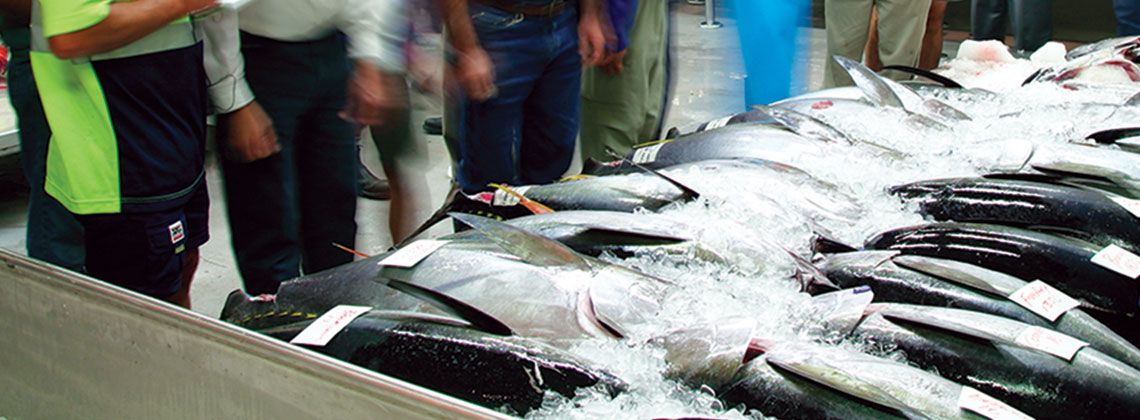
NSW Shellfish committee
Issues considered by the committee on 19 May included:
Sydney Rock Oyster Breeding Program
Industry committee members were advised that expressions of interest have been received for industry positions on the breeding program’s technical working group and reference group and for an Industry Liaison Officer.
Oyster translocation incident
A recent translocation incident of interstate oysters has highlighted the need for industry to better understand oyster shipment requirements. Businesses involved in the incident were given a warning after an investigation of alleged breaches.
Flood recovery workshops
Following the devastating floods experienced across the state earlier this year, industry specific workshops were held at six locations along the coast to discuss support and financial aid services available to industry. Several oyster industry specific issues arose which have been raised with the NSW DPI State Flood Recovery Group.
The NSW Shellfish Committee met again on 18 August, and the summary of meeting outcomes will soon be available on the NSW Food Authority website here.
View a full summary of meeting outcomes from 19 May.
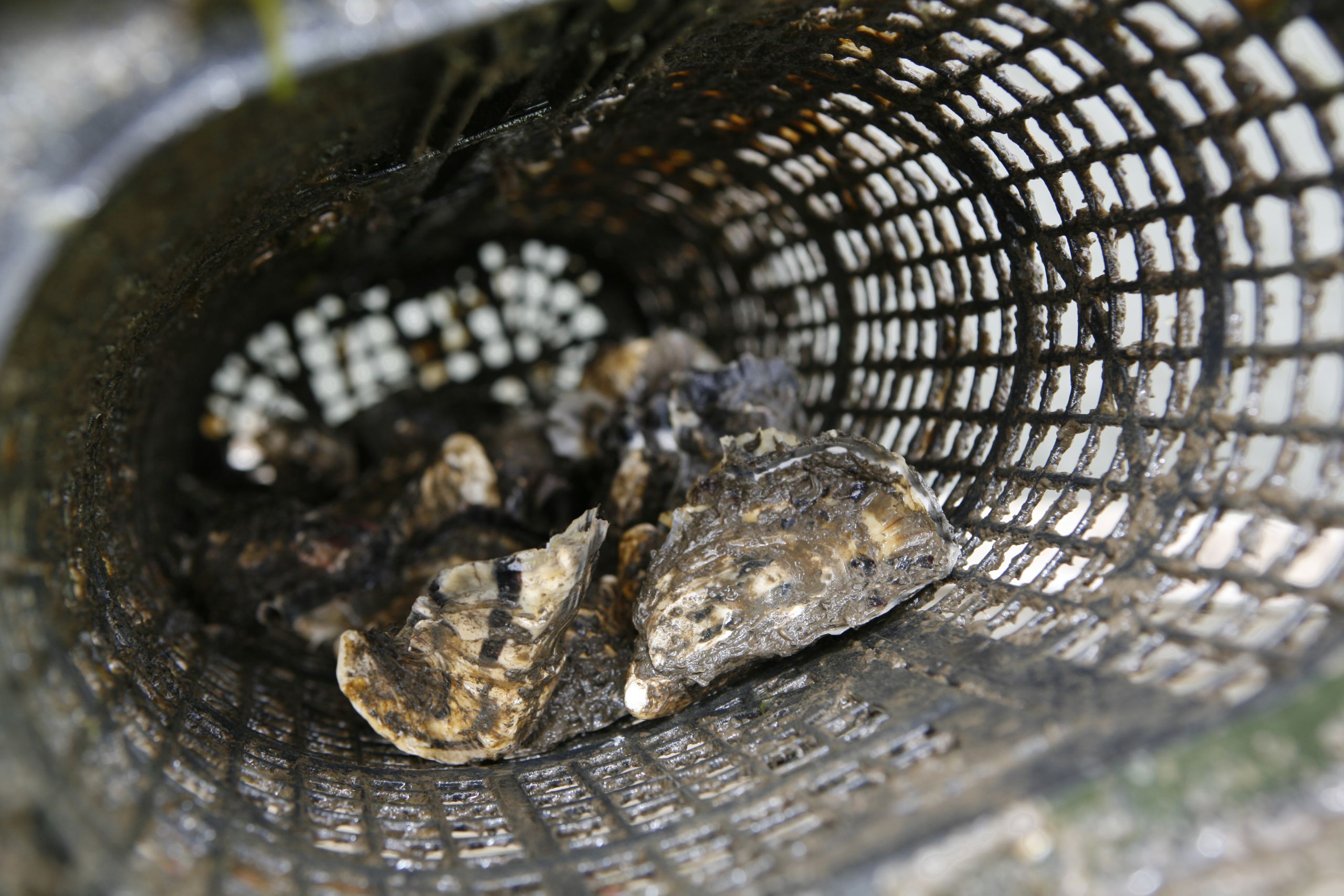
Government grants and assistance for disaster struck aquaculture industry
The NSW Government has made several special disaster grants and assistance programs available to the aquaculture industry in response to the effects of bushfires, COVID-19 and severe flooding over the last 18 months.
Disaster recovery grants of up to $75,000 are available to producers in all Local Government Areas (LGAs) affected by the NSW storms and floods that occurred from 19 February 2021 and from 10 March 2021. The grants deliver initiatives that deliver post disaster recovery for affected communities and industries, as well as reconstruction and improved disaster resilience of public infrastructure.
A $15,000 transport subsidy is also available to eligible farmers who are affected by a declared natural disaster event. The subsidy covers the cost of transporting fodder and/or water to an affected property and stock to sale or slaughter.
The disaster recovery and transport subsidy grants follow $9 million in direct industry support announced by the NSW Government for the State’s commercial fishing and aquaculture industries after the devastating 2019 bushfires and COVID-19 taking a toll on industry.
The $9 million support package includes:
- $4 million in fee waivers for Commercial Fishers
- $2.1 million in fee waivers and rent relief for the Aquaculture industry
- $200,000 in fee waivers for the Charter Boat Fishing Sector
- $500,000 in rent relief for fishing cooperatives located on Crown land
- $2.2 million in industry stimulus programs
Read more about the $9 million NSW seafood industry support package.
Refer to the Declared natural disasters table for grant eligibility in each LGA.
Flood damage to NSW estuaries
The March floods and weather caused losses in key selling time for the NSW oyster industry, with shellfish farms in the mid-north coast losing desperately needed Easter stocks after limited Christmas sales, and farms in the south coast also losing stock and infrastructure due to floods.
The 2021 flood events caused high levels of runoff and sewage overflows resulting in the NSW Food Authority’s Shellfish Program closing shellfish harvest areas to protect consumer health. There are also concerns for the loss of young oyster stock (spat), as freshwater and flood impacts could result in a production gap of 2-3 years.
Satellite image of the Hawkesbury River before the March floods. Credit: PlanetScope
Satellite image of the Hawkesbury River before the March floods. Credit: PlanetScope
Satellite image showing the Hawkesbury River under flood conditions after 24 March. Credit: PlanetScope
Satellite image showing the Hawkesbury River under flood conditions after 24 March. Credit: PlanetScope
Oyster producing estuaries in Nambucca, Hastings, Camden Haven were significantly affected by infrastructure losses. Farms affected by the floods are expected to lose over $30 million in lost stock and the seafood industry could lose over $16 million.
The Food Authority worked with farmers as waters subsided and to begin reopening in mid-to-late April and continued to help farmers manage emerging impacts and issues from heavy rain later in the year.
To help improve water quality monitoring during floods and other crises, Federal Government Bushfire Industry Recovery Package funding directed to the NSW Farmers Association will support the second phase of a Food Agility CRC project focused on real time sensor technology in shellfish harvest areas. This project looks to improve the precision of harvest area management plans and develop models for harmful algal bloom and oyster mortality events to assist in refining farm management practices.
The project is a collaboration between the Food Agility CRC, University of Technology Sydney, NSW Department of Primary Industries, NSW Food Authority, NSW Farmers Association and the Western Australia Department of Primary Industries and Regional Development, along with NSW and WA oyster farmers.
DAIRY
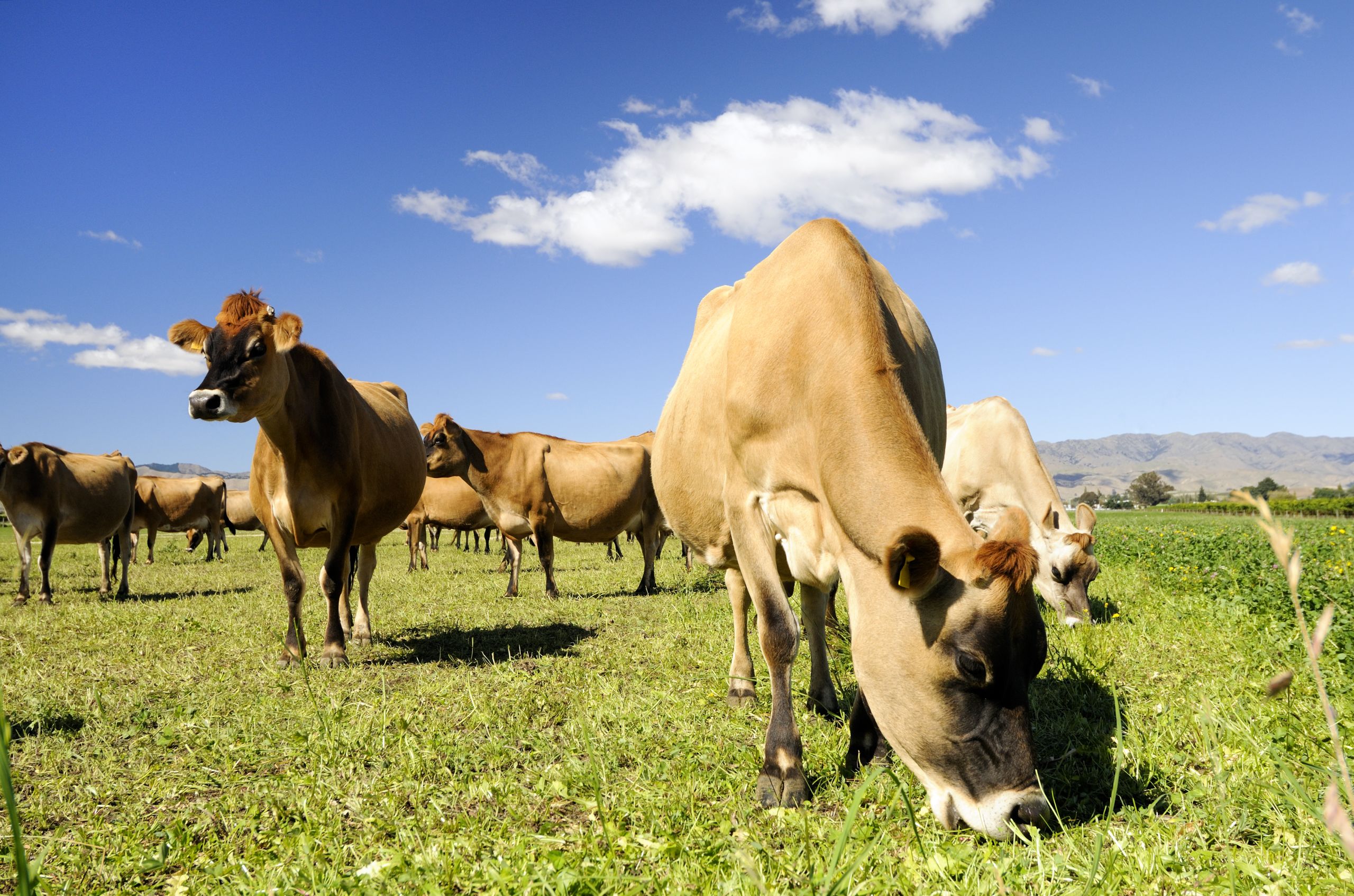
Inspections and audits
From June 2020 to June 2021, the Food Authority conducted 158 inspections and 355 audits of licensed dairy businesses. This industry sector has recorded a compliance rate of 98%. There were no serious enforcement actions taken against licensed dairy business during this period.
The availability of compliance data for all food sectors has been impacted by COVID-19, due to the redirection of resources to COVID-19 related compliance activities and the impacts of this on the regular compliance program.
The below table shows yearly comparable data for compliance and audit activity in the dairy sector between reporting years 2019/20 and 2020/21.
| Reporting period | 2019/20 | 2020/21 |
|---|---|---|
| Total audits | 504 | 355 |
| Total inspections | 126 | 158 |
| Compliance rate | 97% | 98% |
EGGS

Inspections and audits
From June 2020 to June 2021, the Food Authority conducted 235 inspections and 81 audits of licensed egg businesses. This industry sector has recorded a compliance rate of 76% for the 2020/21 reporting period.
In August 2019, the Biosecurity (Salmonella Enteritidis) Control Order 2019 (the Control Order) came into effect following reports of a number of cases of human illness linked to Salmonella Enteritidis (SE) in egg production. Since May 2018, there has been an emergence of cases where people became infected from consuming food locally in NSW. The object of this Control Order is to prevent, eliminate, minimise and manage the biosecurity risk posed or likely to be posed by the spread of Salmonella Enteritidis within NSW.
To assist with the implementation of the Control Order, the NSW Department of Primary Industries developed the SE Egg Management Program which outlines all biosecurity and food safety controls that must be implemented to comply with the Control Order. The Program included existing food safety programs requirements, as well as new hygiene and biosecurity practices that are required in response to SE.
The availability of compliance data for all food sectors has been impacted by COVID-19, due to the redirection of resources to COVID-19 related compliance activities and the impacts of this on the regular compliance program.
The below table shows yearly comparable data for compliance and audit activity in the egg sector between reporting years 2019/20 and 2020/21.
| Reporting period | 2019/20 | 2020/21 |
|---|---|---|
| Total audits | 97 | 81 |
| Total inspections | 382 | 235 |
| Compliance rate | 58% | 76% |
Egg Industry Consultative Committee
Issues considered by the committee via video conference on 7 April included:
Members provided updates on key and emerging issues noting that Egg Farmers of Australia have been focused on the Australian Animal Welfare Standards and guidelines submissions to the Regulatory Impact Statement.
Food Standards Australia New Zealand (FSANZ) has started to review the Primary Production and Processing (PPP) Standard for Eggs and Egg Products, with NSW DPI’s involvement welcomed by industry. Members agreed this is a great opportunity for industry to put forward its concerns and ideas.
A full summary of meeting outcomes is available here.
The EICC met again on 18 August, and the summary of meeting outcomes will soon be available on the NSW Food Authority website here.
The Egg Industry Consultative Committee is attended by representatives from Australian Eggs, NSW Farmers’ Association, Free range egg producers, Australian Eggs, Large egg processors, Large egg producers and NSW Department of Primary Industries.
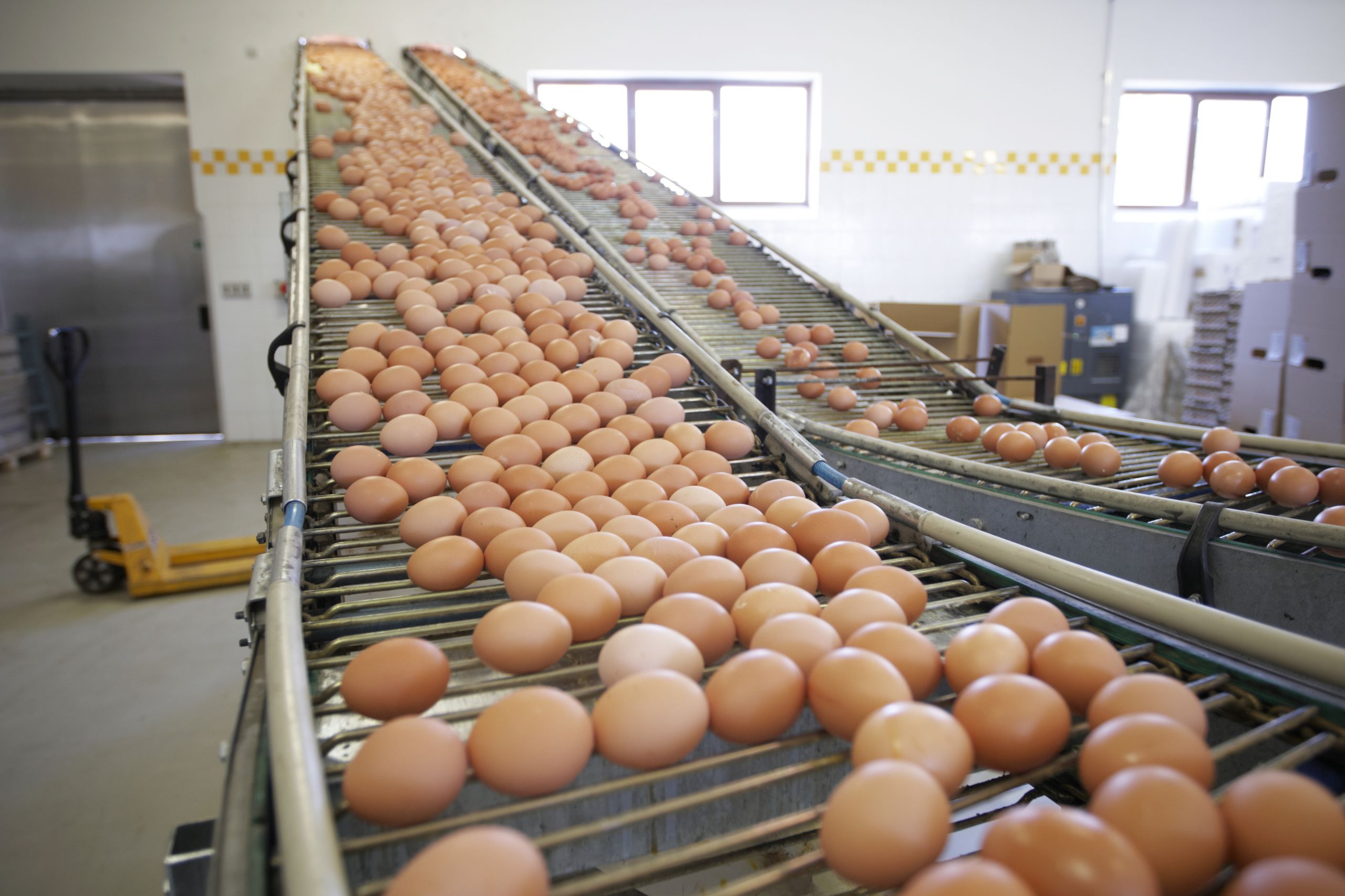
Salmonella Enteritidis mandatory testing
On 30 June 2020, the Biosecurity (Salmonella Enteritidis) Control Order 2020 was amended to include mandatory testing for Salmonella Enteritidis (SE) which came into effect on 1 July 2020. This amendment requires all licensed egg businesses that produce eggs in NSW to undertake mandatory and routine testing of their facility for SE.
At the time, NSW Department of Primary Industries (DPI) advised producers of a grace period that ended on 1 October 2020.
This testing is critical to the eradication and prevention of SE in the food chain to ensure the safety of eggs and egg products and maintain consumer confidence in the egg industry.
Pullet rearing facilities, breeder farms and chicken meat farms are not required to conduct sampling and testing for SE. However, if a breeder farm also produces and sells eggs for consumption, they will need to carry out this testing.
A General Circular was recently sent to all egg producers licensed with the NSW Food Authority which provided information on available options to comply with testing requirements, as well as links to available resources. It also advised how industry can access funding provided by DPI to ensure testing requirements are met. This support will remain in place until the Control Order expires.
For more information, access the full General Circular - Salmonella Enteritidis mandatory testing here.
PLANTS

Inspections and audits
From June 2020 to June 2021, the Food Authority conducted 83 inspections and 84 audits of licensed plant product businesses. This industry sector has recorded a compliance rate of 92%.
The availability of compliance data for all food sectors has been impacted by COVID-19, due to the redirection of resources to COVID-19 related compliance activities and the impacts of this on the regular compliance program.
The below table shows yearly comparable data for compliance and audit activity in the plant sector between reporting years 2019/20 and 2020/21.
| Reporting period | 2019/20 | 2020/21 |
|---|---|---|
| Total audits | 120 | 84 |
| Total inspections | 45 | 83 |
| Compliance rate | 93% | 92% |
2021 Fresh Produce Safety Conference
NSW Food Authority partnered with the Fresh Produce Safety Centre Australia and New Zealand for the annual Fresh Produce Safety Conference which was held online, 18 August.
Originally to be hosted at the University of Sydney, the Fresh Produce Safety Conference (FPSC) was moved to an online-only event in response to COVID-19 lockdowns and border restrictions, ensuring audiences, speakers and sponsors could still participate.
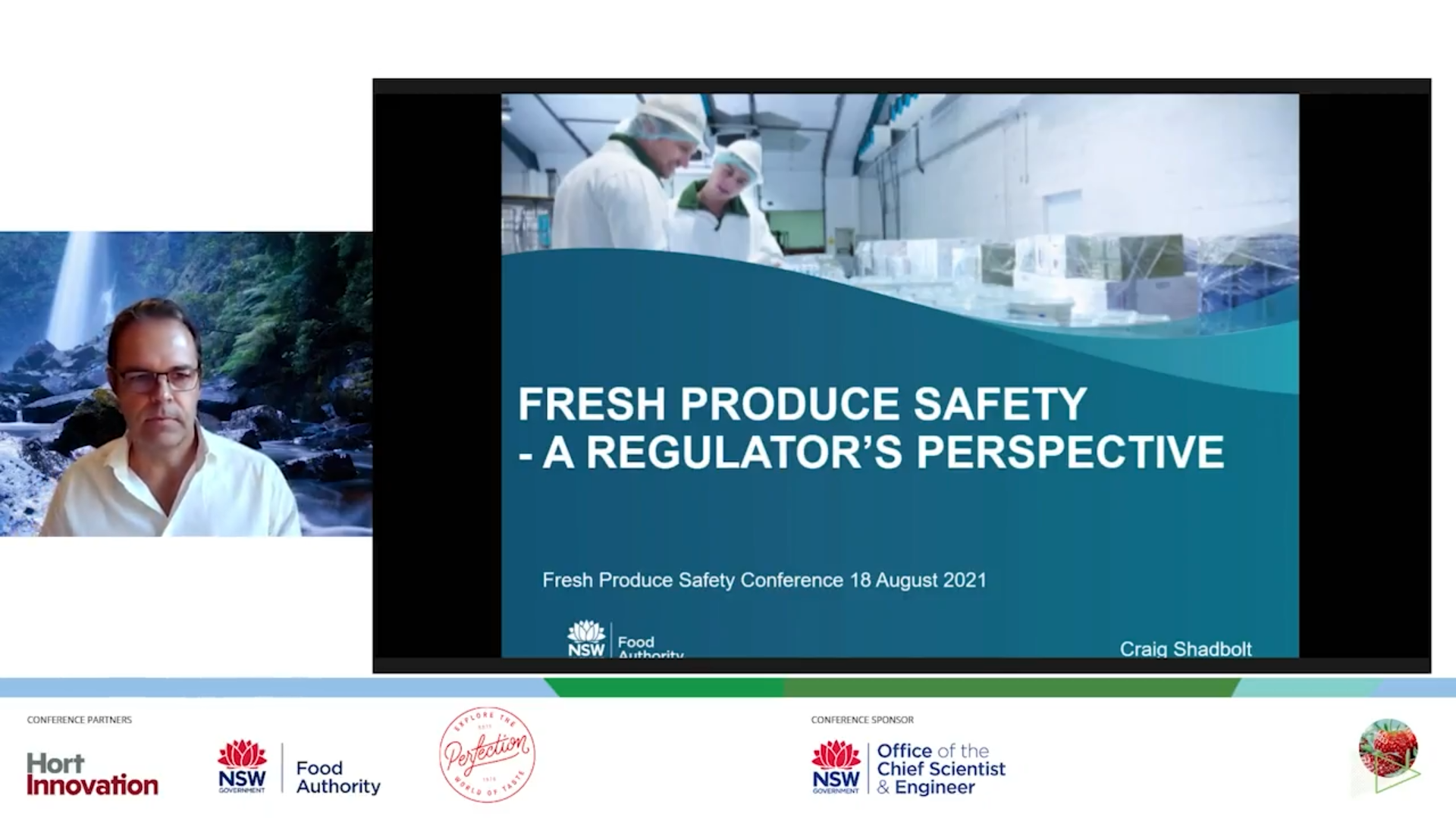
Dr Craig Shadbolt presents in the 'Produce safety: what’s at stake?' session.
Dr Craig Shadbolt presents in the 'Produce safety: what’s at stake?' session.
The theme, ‘Future Directions for Produce Safety’ featured leading produce executives, researchers and practitioners who focus on innovative approaches to food safety. Over 200 food safety practitioners, CEOs, managers, food technologists, researchers, growers and supply chain specialists joined the event.
NSW Food Authority scientists also featured at the conference with Principal Food Safety Scientist, Dr Craig Shadbolt providing a regulatory perspective in a panel discussion on produce safety. Food Safety Scientist, Dr Thea King also joined a future food safety panel relating to new research in environmental impacts on fresh produce food safety to discuss extreme weather events and pre-harvest food safety.
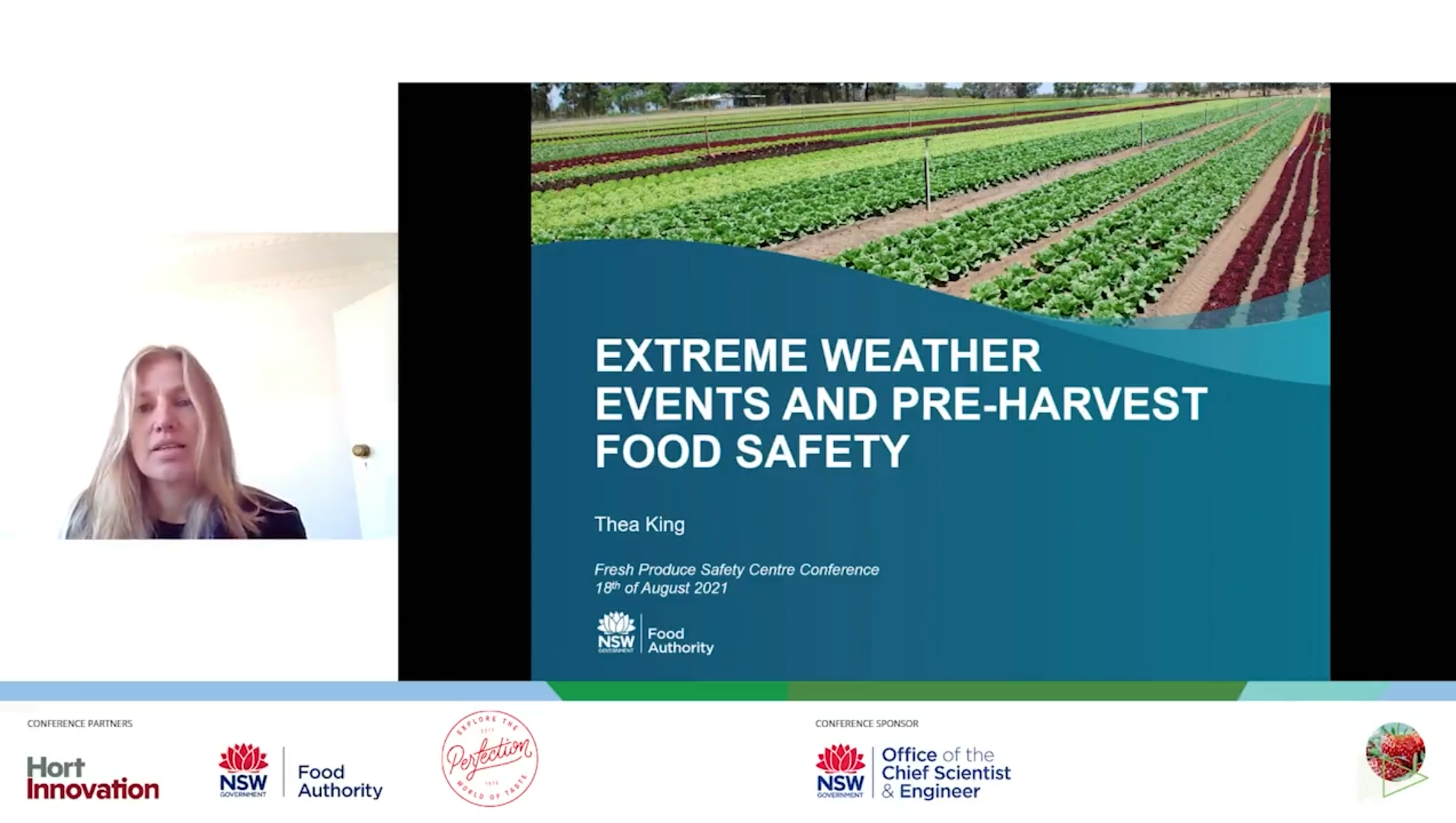
Dr Thea King presents in the 'New research in environmental impacts on fresh produce food safety' session
Dr Thea King presents in the 'New research in environmental impacts on fresh produce food safety' session
The day concluded with panel sessions on the future of food safety for growers and a student led discussion on the next generation of food safety researchers.
Further FPSC sessions have been scheduled for September, click here for more information.
Safety survey of growing plant-based food product market
The market for plant-based products as alternatives to animal products like meat and dairy has increased in Australia over recent years. Increasing concerns around sustainability of meat and livestock production, allergies or intolerances, and an increase in popularity of vegetarian and vegan diets have increased the demand for plant-based food products.

While existing reports mainly focus on the nutritional aspects or consumers’ acceptance of plant-based food products, information on the microflora of plant-based alternative products is not widely available.
Four of the most important control measures for ensuring the safe production of these products involves using high quality raw ingredients with low microbial load, effective heat treatment, strict hygiene and sanitation regime, and appropriate cooking instructions for ‘raw’ products.
The NSW Food Authority carried out the Plant-based alternative products survey to gather information on the microbiological safety of these products and their labelling compliance with the Australia New Zealand Food Standards Code (the Code). To complete the survey, 85 plant-based alternative products available in NSW supermarkets, green grocers and through online shops were tested for a range of microorganisms, pH and water activity.
Food products included in the survey were found to have no microbiological safety concerns with three quarters of the products having compliant labels according to the Code.
The survey found products with unsubstantiated nutritional claims and nutritional information panel not complying with the Standard. If a product continued to have a non-compliant label after a reassessment, NSW based manufacturers or importers were sent an advisory letter asking the business to rectify the issue. Businesses based in other jurisdictions were referred to the appropriate regulatory body.
The top four non-compliant issues with labels were:
- Seven labels had unsubstantiated nutritional claims.
- All labels had a nutrition information panel (NIP), however seven of them had American or European style NIPs so did not comply with the requirements in the Code.
- Six imported products did not have the name of importer and address in Australia.
- Four imported products did not have an allergen statement even though they contained soy or wheat.
Read the survey results here.
VULNERABLE PERSONS

Inspections and audits
From June 2020 to June 2021, the Food Authority conducted 72 inspections and 1,302 audits of licensed hospitals and aged care businesses. This industry sector has maintained a high compliance rate with 99% of businesses recording an acceptable result. This industry sector has maintained a high compliance rate for an extended period, due to the correct implementation of food safety controls and ensuring staff have the necessary skills and knowledge.
The availability of compliance data for all food sectors has been impacted by COVID-19, due to the redirection of resources to COVID-19 related compliance activities and the impacts of this on the regular compliance program.
The below table shows yearly comparable data for compliance and audit activity in the vulnerable persons sector between reporting years 2019/20 and 2020/21.
| Reporting period | 2019/20 | 2020/21 |
|---|---|---|
| Total audits | 1,122 | 1,302 |
| Total inspections | 85 | 72 |
| Compliance rate | 99% | 99% |
Food safety outreach for the over 65s
The NSW Food Authority is developing a food safety education program for some of NSW’s most vulnerable populations which was recently trialled at a seniors education centre in Narrabeen.
NSW Food Authority Principal Food Safety Scientist, Craig Shadbolt and Communications Manager, Geneveive Bonello ran the education session with a group of highly engaged seniors at the Sydney University of the Third Age (Sydney U3A). U3A offers hundreds of intellectually stimulating courses across Sydney in the arts, sciences, history, leisure, language, computing and fitness.

Dr Craig Shadbolt presents to the Sydney U3A group
Dr Craig Shadbolt presents to the Sydney U3A group
The education session was designed to increase food safety awareness for over 65s who are more susceptible to food poisoning as their immune system weakens. Around 20 people with compromised immune systems contract foodborne listeriosis every year in NSW. Other complications such as cancer treatment or other health conditions also increase the risk of foodborne disease significantly for people with weakened immune systems.

Dr Craig Shadbolt and Geneveive Bonello with life-time member of Sydney U3A, Ian Thompson.
Dr Craig Shadbolt and Geneveive Bonello with life-time member of Sydney U3A, Ian Thompson.
The NSW Food Authority looks to roll the education sessions out more widely after initial feedback showed the education session was a huge success with the group.
Learn more about the Sydney University of the Third Age here.
MANUFACTURING

Plain English allergen food label requirements
Food Standards Australia New Zealand (FSANZ) have changed the Food Standards Code (The Code) to introduce new requirements for labelling the most common allergens in food.
Under the new requirements food labels must have consistent, simple and plain English terms for allergen declarations to help people find allergen information more quickly and easily, so they can make informed and safe food choices.
The changes include:
- using consistent names that are simple, plain English and in bold font
- displaying declarations in a specific format and location on food labels
Declarations of one or more allergens must appear in the ingredient list and a co-located summary statement.
In the ingredient list and summary statement, allergen declarations must be in:
- bold font that contrasts distinctly with other text; and
- the same size or greater type
In the summary statement, allergen declarations must say:
- ‘Contains: (name of allergen/s)’
The most common allergens must be declared on food labels of food packages as required in Schedule 9 of the Food Standards Code:
- Peanut
- Almond
- Brazil nut
- Cashew
- Hazelnut
- Macadamia
- Pecan
- Pine nut
- Pistachio
- Walnut
- Eggs
- Milk (dairy)
- Fish
- Crustacea (e.g. prawns, lobster)
- Mollusc (e.g. oyster, calamari)
- Sesame
- Soy, soya or soybean
- Wheat
- Lupin
- Gluten containing cereals including barley, oats, rye, wheat
The changes to The Code were introduced 25 February 2021, however food businesses have 3 years to transition to the new requirements plus an additional 2 years for food that has been correctly labelled before 25 February 2024. During the 3 year transition, allergen declarations must follow the old or the new system. They cannot be a combination of both.
More information on the new requirements is available on the NSW Food Authority Changes to allergen labelling webpage.
PROCESSES
FSANZ call for submissions
Food Standards Australia New Zealand (FSANZ) has recently released a call for written submissions on the draft variation to the Code arising from the following applications:
- Proposal P1028 – Infant Formula. Consultation Paper 2 2021 - Nutrient Composition to revise and clarify standards relating to infant formula products comprising category definitions, composition, labelling and representation of products. Written submissions are due by 6pm (Canberra time) 2 September 2021. Read more.
- Application A1211 - Maltogenic alpha amylase enzyme from GM Bacillus Licheniformis to permit a new source microorganism, being a genetically modified Bacillus licheniformis, for the permitted enzyme, maltogenic alpha amylase. Written submissions are due by 6pm (Canberra time) 8 September 2021. Read more.




